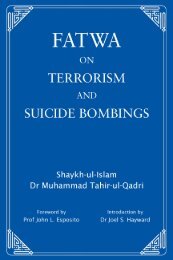Air Power, Insurgency and the âWar on Terrorâ - Prof. Joel Hayward's ...
Air Power, Insurgency and the âWar on Terrorâ - Prof. Joel Hayward's ...
Air Power, Insurgency and the âWar on Terrorâ - Prof. Joel Hayward's ...
You also want an ePaper? Increase the reach of your titles
YUMPU automatically turns print PDFs into web optimized ePapers that Google loves.
Techniques <str<strong>on</strong>g>and</str<strong>on</strong>g> Gadgets, Hearts <str<strong>on</strong>g>and</str<strong>on</strong>g> Minds: An Analysis of Operati<strong>on</strong> Ranch H<str<strong>on</strong>g>and</str<strong>on</strong>g><br />
<str<strong>on</strong>g>and</str<strong>on</strong>g> Research, wrote in his memoir that <str<strong>on</strong>g>the</str<strong>on</strong>g> Defense Department overrode <str<strong>on</strong>g>the</str<strong>on</strong>g> State<br />
Department’s c<strong>on</strong>cerns about unintended c<strong>on</strong>sequences.<br />
The State Department view … was that <str<strong>on</strong>g>the</str<strong>on</strong>g> political repercussi<strong>on</strong>s<br />
would outweigh any possible gains. Defoliati<strong>on</strong> was just too<br />
reminiscent of gas warfare. It would cost us internati<strong>on</strong>al support<br />
<str<strong>on</strong>g>and</str<strong>on</strong>g> <str<strong>on</strong>g>the</str<strong>on</strong>g> Viet C<strong>on</strong>g would use it to good propag<str<strong>on</strong>g>and</str<strong>on</strong>g>a advantage as an<br />
example of <str<strong>on</strong>g>the</str<strong>on</strong>g> Americans making war <strong>on</strong> <str<strong>on</strong>g>the</str<strong>on</strong>g> peasants. 263<br />
Kennedy made <str<strong>on</strong>g>the</str<strong>on</strong>g> decisi<strong>on</strong> that <str<strong>on</strong>g>the</str<strong>on</strong>g> strategic benefits of defoliati<strong>on</strong> would outweigh any<br />
political <str<strong>on</strong>g>and</str<strong>on</strong>g> symbolic problems.<br />
The White House counted <strong>on</strong> Diệm to inoculate <str<strong>on</strong>g>the</str<strong>on</strong>g>m from adverse publicity by aiding<br />
those civilians affected by chemical spraying. What <str<strong>on</strong>g>the</str<strong>on</strong>g> administrati<strong>on</strong> did not fully<br />
appreciate was <str<strong>on</strong>g>the</str<strong>on</strong>g> divergence between <str<strong>on</strong>g>the</str<strong>on</strong>g> interests of <str<strong>on</strong>g>the</str<strong>on</strong>g> Diệm government <str<strong>on</strong>g>and</str<strong>on</strong>g> those<br />
of <str<strong>on</strong>g>the</str<strong>on</strong>g> South Vietnamese <str<strong>on</strong>g>the</str<strong>on</strong>g>mselves. Some senior officials suspected even before <str<strong>on</strong>g>the</str<strong>on</strong>g> food<br />
interdicti<strong>on</strong> campaign that Diệm would not do his part to ensure <str<strong>on</strong>g>the</str<strong>on</strong>g> safety of South<br />
Vietnamese citizens, insofar as that was possible. “[Food denial] should begin <strong>on</strong>ly after<br />
development of a careful program of resettling <str<strong>on</strong>g>the</str<strong>on</strong>g> innocent populati<strong>on</strong>s of <str<strong>on</strong>g>the</str<strong>on</strong>g> areas <str<strong>on</strong>g>and</str<strong>on</strong>g><br />
assurance that <str<strong>on</strong>g>the</str<strong>on</strong>g>y have adequate replacement food supplies. So far as we can tell, Diem<br />
has no such plans now developed”. 264<br />
The State Department, however, suggested that<br />
<str<strong>on</strong>g>the</str<strong>on</strong>g> South Vietnamese government take <str<strong>on</strong>g>the</str<strong>on</strong>g> lead in resettlement <str<strong>on</strong>g>and</str<strong>on</strong>g> food distributi<strong>on</strong>. 265<br />
Relying <strong>on</strong> Diệm to protect <str<strong>on</strong>g>the</str<strong>on</strong>g> South Vietnamese from Ranch H<str<strong>on</strong>g>and</str<strong>on</strong>g> proved a mistake. As<br />
late as April 1963, <str<strong>on</strong>g>the</str<strong>on</strong>g> State Department feared that “our use of defoliant chemicals may<br />
have been premature,” because <str<strong>on</strong>g>the</str<strong>on</strong>g> South Vietnamese <str<strong>on</strong>g>the</str<strong>on</strong>g>mselves were likely bearing <str<strong>on</strong>g>the</str<strong>on</strong>g><br />
impact. 266 The Diệm government’s plans for resettlement <str<strong>on</strong>g>and</str<strong>on</strong>g> food distributi<strong>on</strong>, such as<br />
<str<strong>on</strong>g>the</str<strong>on</strong>g>y were, did not prevent <str<strong>on</strong>g>the</str<strong>on</strong>g> crop destructi<strong>on</strong> efforts from alienating <str<strong>on</strong>g>the</str<strong>on</strong>g> very people<br />
<str<strong>on</strong>g>the</str<strong>on</strong>g> US needed as allies. A 1967 study by <str<strong>on</strong>g>the</str<strong>on</strong>g> RAND Corporati<strong>on</strong> estimated that 325,000<br />
South Vietnamese experienced crop damage as a result of chemical sprayings. Through<br />
interviews, RAND determined that 88 percent of villagers interviewed “blamed <str<strong>on</strong>g>the</str<strong>on</strong>g> US/<br />
GVN for <str<strong>on</strong>g>the</str<strong>on</strong>g> destructi<strong>on</strong> of <str<strong>on</strong>g>the</str<strong>on</strong>g>ir crops <str<strong>on</strong>g>and</str<strong>on</strong>g> 74 percent expressed outright hatred.” 267<br />
Oppositi<strong>on</strong> to <str<strong>on</strong>g>the</str<strong>on</strong>g> use of defoliants <str<strong>on</strong>g>and</str<strong>on</strong>g> herbicides was not limited to South Vietnam.<br />
Religious leaders in <str<strong>on</strong>g>the</str<strong>on</strong>g> US took out ads in <str<strong>on</strong>g>the</str<strong>on</strong>g> New York Times to protest <str<strong>on</strong>g>the</str<strong>on</strong>g> administrati<strong>on</strong>’s<br />
“immoral spraying.” 268 Organised US protests against <str<strong>on</strong>g>the</str<strong>on</strong>g> use of chemicals in Vietnam<br />
were widespread by 1966, when a group of 29 scientists signed a statement directed to<br />
President Lynd<strong>on</strong> Johns<strong>on</strong>. The statement c<strong>on</strong>demned <str<strong>on</strong>g>the</str<strong>on</strong>g> use of chemicals in Vietnam<br />
as barbarous, calling <str<strong>on</strong>g>the</str<strong>on</strong>g>m “an attack <strong>on</strong> <str<strong>on</strong>g>the</str<strong>on</strong>g> entire populati<strong>on</strong>.” 269 With that statement,<br />
122<br />
<str<strong>on</strong>g>Air</str<strong>on</strong>g> <str<strong>on</strong>g>Power</str<strong>on</strong>g>, <str<strong>on</strong>g>Insurgency</str<strong>on</strong>g> <str<strong>on</strong>g>and</str<strong>on</strong>g> <str<strong>on</strong>g>the</str<strong>on</strong>g> “War <strong>on</strong> Terror”





